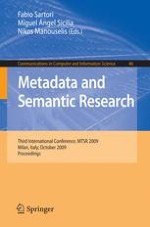2009 | Buch
Metadata and Semantic Research
Third International Conference, MTSR 2009, Milan, Italy, October 1-2, 2009. Proceedings
herausgegeben von: Fabio Sartori, Miguel Ángel Sicilia, Nikos Manouselis
Verlag: Springer Berlin Heidelberg
Buchreihe : Communications in Computer and Information Science
